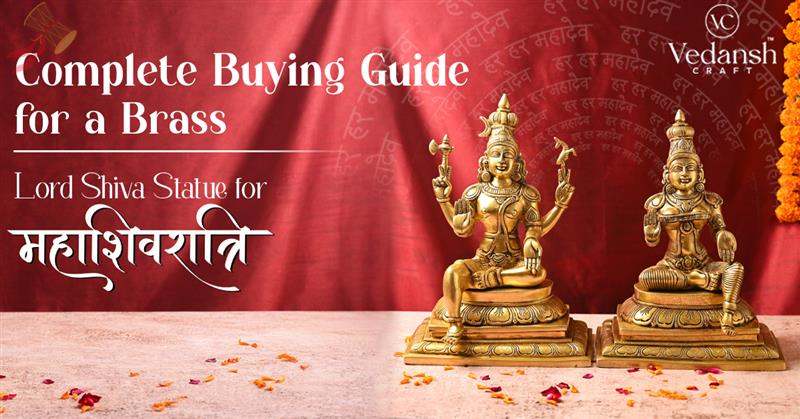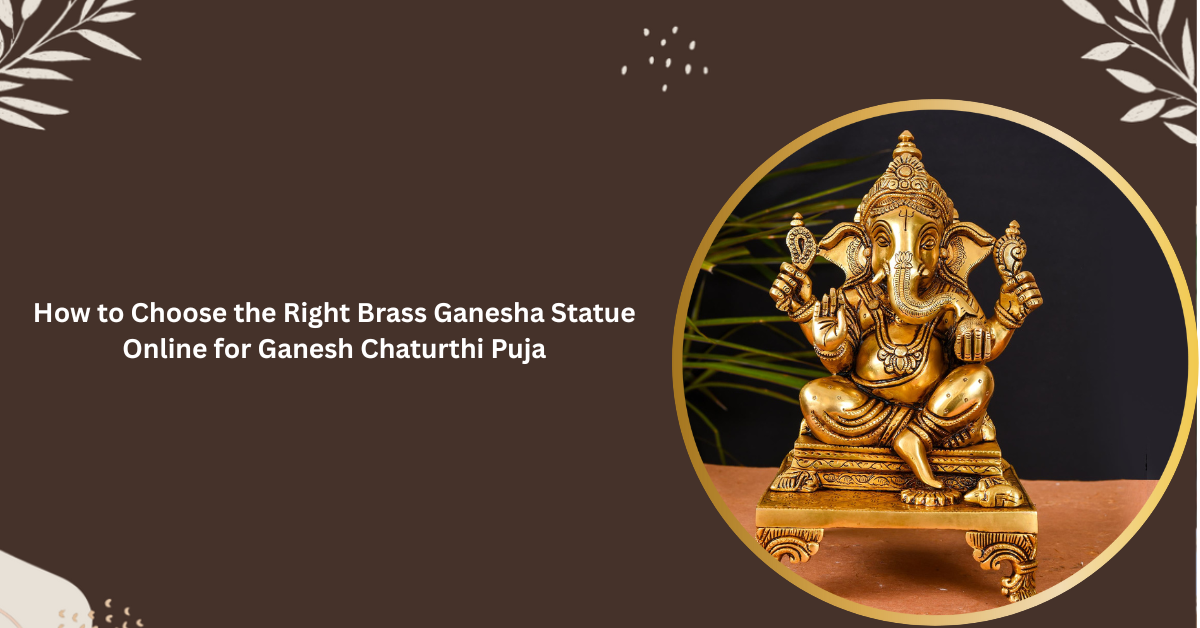

Which God Idols Can Be Kept At Home?
, by javed techqart, 11 min reading time
In Hinduism, the use of God's idols holds immense significance. It is deeply ingrained in households' religious and cultural fabric. God's idols are not mere decorative pieces but are considered sacred manifestations of the divine. They serve as tangible representations of the deities and act as a medium through which devotees can establish a personal connection with the divine.
Hindus believe that the presence of God's idols in their homes brings blessings, protection, and positive energy. These idols are a focal point for daily worship and rituals, reminding one of one's faith and devotion. They create an ambiance of spirituality and provide comfort and solace in distress. In essence, God's idols are revered as a spiritual anchor in Hindu households, fostering a deep sense of religiosity and spirituality.
Choosing Appropriate Hindu God Idols for Your Home
Selecting the right Hindu God idols for your home is a decision that should not be taken lightly. It involves thoughtful consideration of various factors to ensure the chosen idols align with your beliefs, values, and the spiritual atmosphere you wish to cultivate within your living space. The choice of God's idols can greatly impact the energy and aura of your home.
The right deities in your home can enhance the spiritual ambiance, while improper choices may disrupt the harmony. These idols' size, placement, and aesthetic appeal can affect your home's overall decor and atmosphere. Therefore, making informed choices that reflect your religious and spiritual inclinations is crucial.
Factors to Consider in Hinduism
- Personal Beliefs and Devotion
When selecting Hindu God idols for your home, it is vital to consider your personal beliefs and devotion. Different deities are associated with various aspects of life, such as wisdom, prosperity, protection, and love. Your choice of idols should align with your spiritual inclinations and the specific blessings or qualities you seek in your life. For example, if you value wisdom and knowledge, you may choose to keep a Saraswati idol in your home.
- Size and Space
The size of your living space plays a pivotal role in determining the appropriate size of Hindu God idols you can accommodate. Compact idols may be more suitable in smaller homes or apartments, as they can be placed on shelves or small altars without overwhelming the space. Larger homes may allow for more substantial idols that serve as focal points within a dedicated prayer room or temple space.
Hindu God idols are available in various sizes, from miniature forms that can fit in the palm of your hand to life-sized statues. It's essential to consider the aesthetics and proportions of the idols concerning the available space. Smaller idols may be ideal for personal altars or meditation corners, while larger idols can be showcased prominently in spacious prayer rooms or dedicated temple spaces.
Aesthetic Appeal and Symbolism
In Hinduism, the appearance of God's idols is not merely a matter of aesthetics; it carries profound spiritual and symbolic significance. The physical form of the deity is believed to represent the divine tangibly, making it easier for devotees to connect with the spiritual realm. Therefore, the idol's appearance should resonate with the devotee deeply spiritually.
The symbolism embodied by the idol's appearance often reflects the attributes and qualities associated with the deity. For example, Lord Ganesha is depicted with an elephant head, symbolizing wisdom and the removal of obstacles. Goddess Lakshmi is often portrayed with four arms, each carrying symbolic items representing wealth, prosperity, love, and righteousness.
The idols' colors, postures, and facial expressions convey specific messages. Vibrant colors symbolize vitality and energy, while serene expressions signify tranquility and divine grace. Devotees often choose idols whose symbolism aligns with their spiritual goals and personal values.
Different Artistic Styles in Hindu God Idols
Hindu God idols come in various artistic styles and forms, each with its unique beauty and symbolism. Some common artistic styles and symbolic elements in these idols include:
- Brass and Metal Idols
These traditional idols are intricately crafted, often portraying deities in detailed poses and adorned with symbolic ornaments. Using metals like brass is aesthetically pleasing and symbolizes durability and strength.
- Stone Carvings
Idols carved from various stones, such as marble or granite, are highly revered for their timeless beauty. The fine detailing and craftsmanship in stone idols often convey a sense of divine grace and permanence.
- Wooden Idols
Wooden idols are known for their warm and rustic appeal. They can be beautifully carved to capture the essence of the deity and are often chosen for their natural and organic aesthetics.
- Terracotta and Clay Idols
Often used during festivals, these idols have a rustic charm and are associated with the earth element. They are considered close to nature and are believed to bring an earthy energy to the worship space.
- Mudra (Hand Gestures)
Many idols feature specific hand gestures or mudras that convey deeper meanings. For instance, Lord Buddha's hand gesture in meditation symbolizes enlightenment, while the Abhaya mudra of Lord Ganesha represents protection and fearlessness.
Devotees can choose an artistic style and symbolic elements that resonate with their personal preferences and spiritual connection. The diversity in artistic representation allows for a rich tapestry of options, ensuring that individuals can find an idol that truly speaks to their hearts.
Maintenance and Worship Practices of Idols
Hindu God idols are not static objects but living symbols of the divine that require care and attention. Regular maintenance and worship rituals are essential to uphold their spiritual significance. Devotees should establish a daily routine that includes cleaning, dressing, and offering prayers to the idols.
- Cleaning
Dusting and cleaning the idol is an act of reverence. It keeps the idol's surface free from impurities and maintains its visual appeal. This daily cleaning is often performed before morning or evening prayers.
- Dressing
Many Hindu God idols are adorned with clothing and ornaments. Devotees change their attire based on the day and season, adding a layer of devotion to the worship.
- Offering Prayers
Daily worship rituals, known as puja, involve offering the deity flowers, incense, lamps, and food. This practice fosters a direct connection with the divine and reinforces the devotee's spiritual commitment.
Specific Offerings for Different Hindu God Idols
Each deity has unique preferences and traditions associated with their worship. For instance:
- Lord Ganesha is often offered modak (a sweet delicacy) and red flowers.
- Goddess Lakshmi is worshiped with lotus flowers and offerings of sweets and fruits.
- Lord Shiva may receive bilva leaves, water, and bael fruit offerings.
Specific mantras and prayers are recited during worship, and devotees may choose to perform elaborate rituals on special occasions or festivals. It is essential for devotees to learn the proper worship practices associated with their chosen deities and to maintain a respectful and devoted approach to the care and worship of their God idols. This ensures that the idols continue to radiate spiritual energy and blessings in the home.
Common Hindu God Idols for Homes
- Lord Ganesha
Lord Ganesha, often affectionately referred to as "Ganpati" or "Vinayaka," is one of the most beloved and widely worshiped deities in Hinduism. He is easily recognizable by his distinctive elephant-headed appearance, which carries profound symbolism.

- Lord Shiva
Lord Shiva, often called the "Destroyer" within the Hindu Trinity (alongside Brahma, the Creator, and Vishnu, the Preserver), is a complex and revered deity with deep symbolism and a vast following.

- Goddess Lakshmi
Goddess Lakshmi is revered as the goddess of wealth, prosperity, and abundance in Hinduism. Her presence in Hindu homes signifies the desire for material and spiritual prosperity.

Selecting Hindu God Idols that Resonate with Personal Beliefs and Values
Choosing Hindu God idols for your home is deeply personal and spiritually significant. Selecting idols that align with your personal beliefs, values, and the blessings you seek in your life is crucial. By choosing deities that resonate with your heart and soul, you create a spiritual connection that enhances the overall ambiance of your home.
When properly chosen and cared for, these idols radiate positive energy, create a sense of tranquility, and serve as sources of inspiration and solace during life's various challenges and celebrations.
Remember that these idols are not just pieces of art but sacred representations of the divine. By making informed choices and maintaining a dedicated worship routine, you can create a sacred and harmonious atmosphere in your home where spirituality thrives and the blessings of the divine are abundant.
In doing so, you enrich your spiritual journey and create a sacred space that can positively influence the lives of all who enter your home, fostering a sense of peace, well-being, and spiritual fulfillment.
Blog posts




